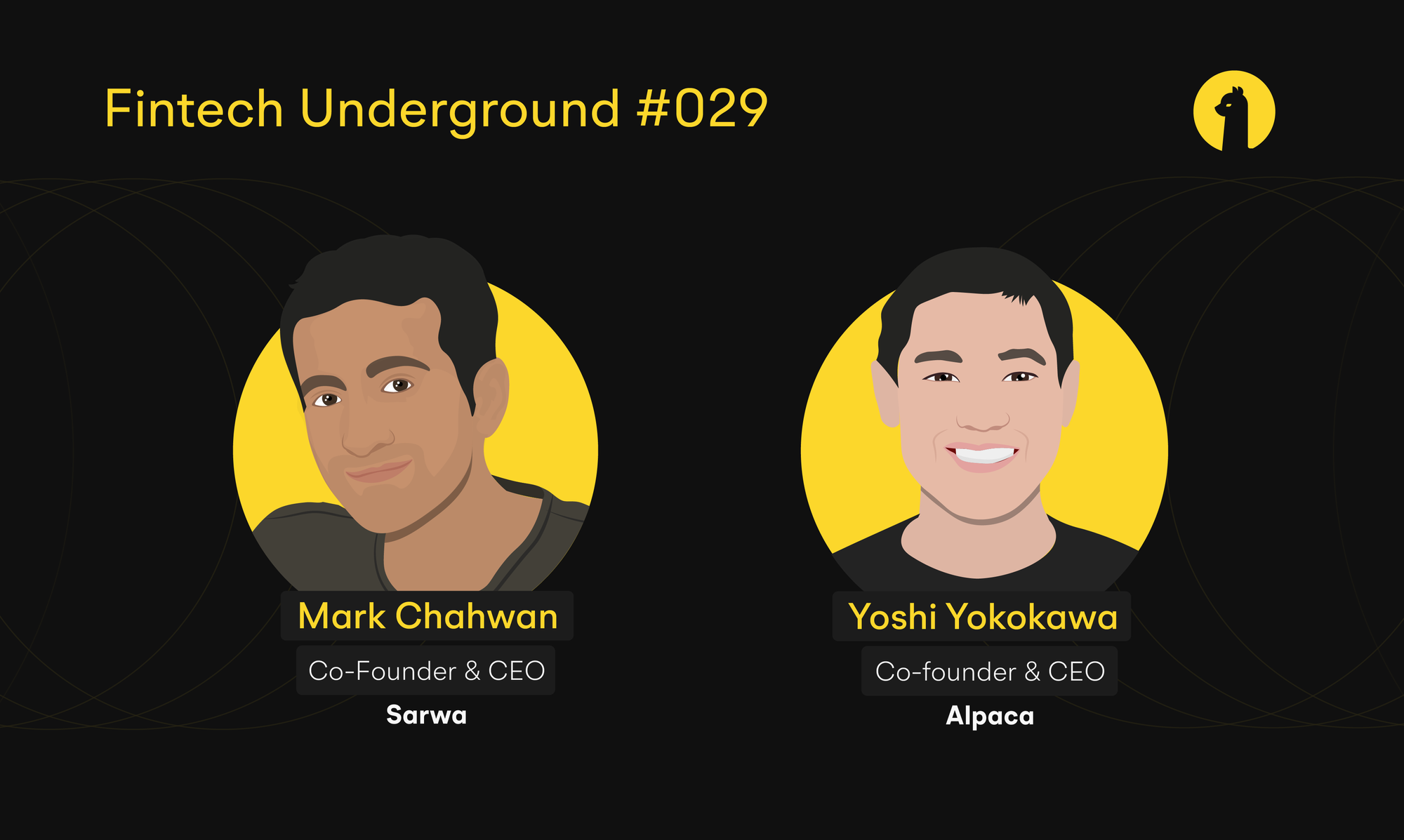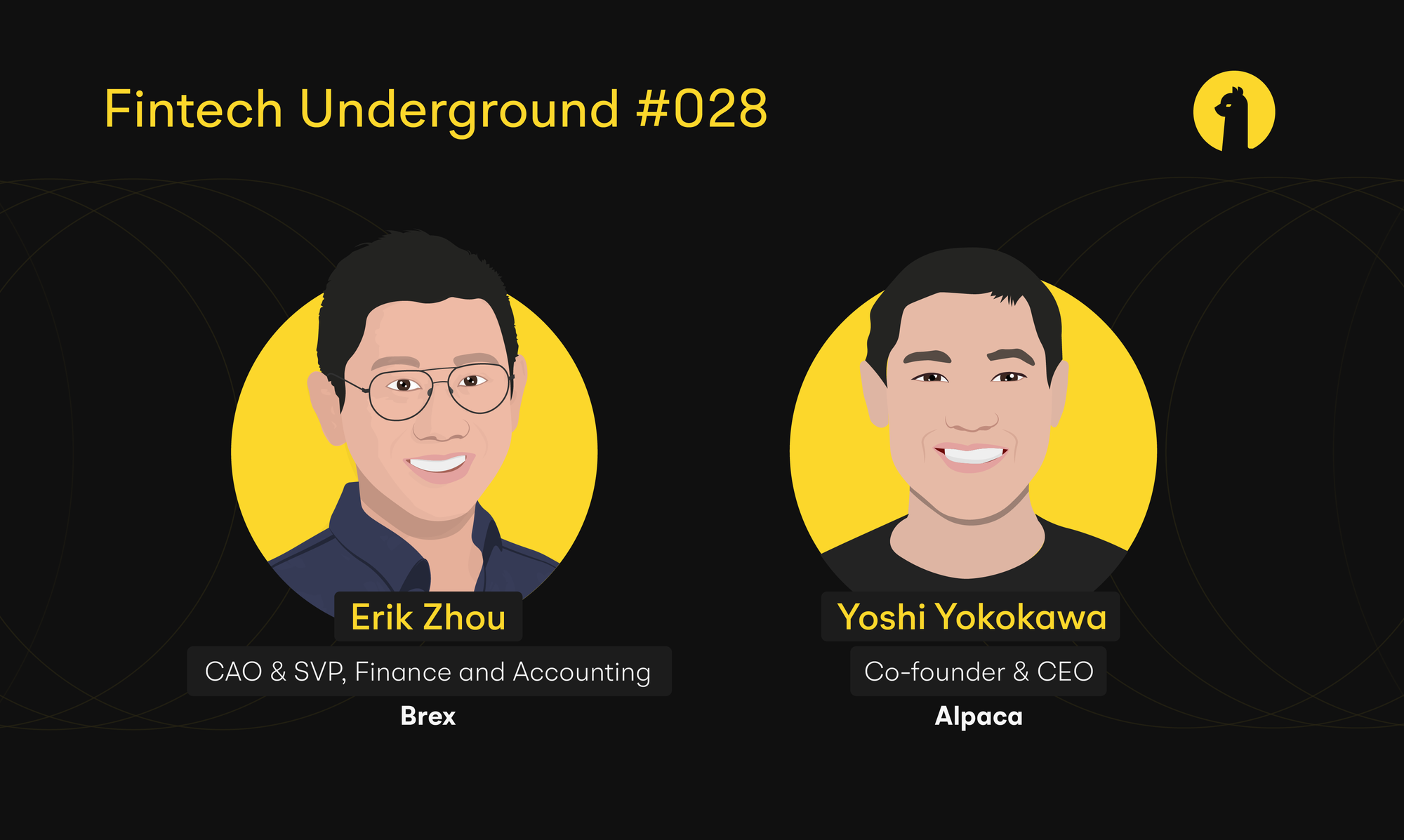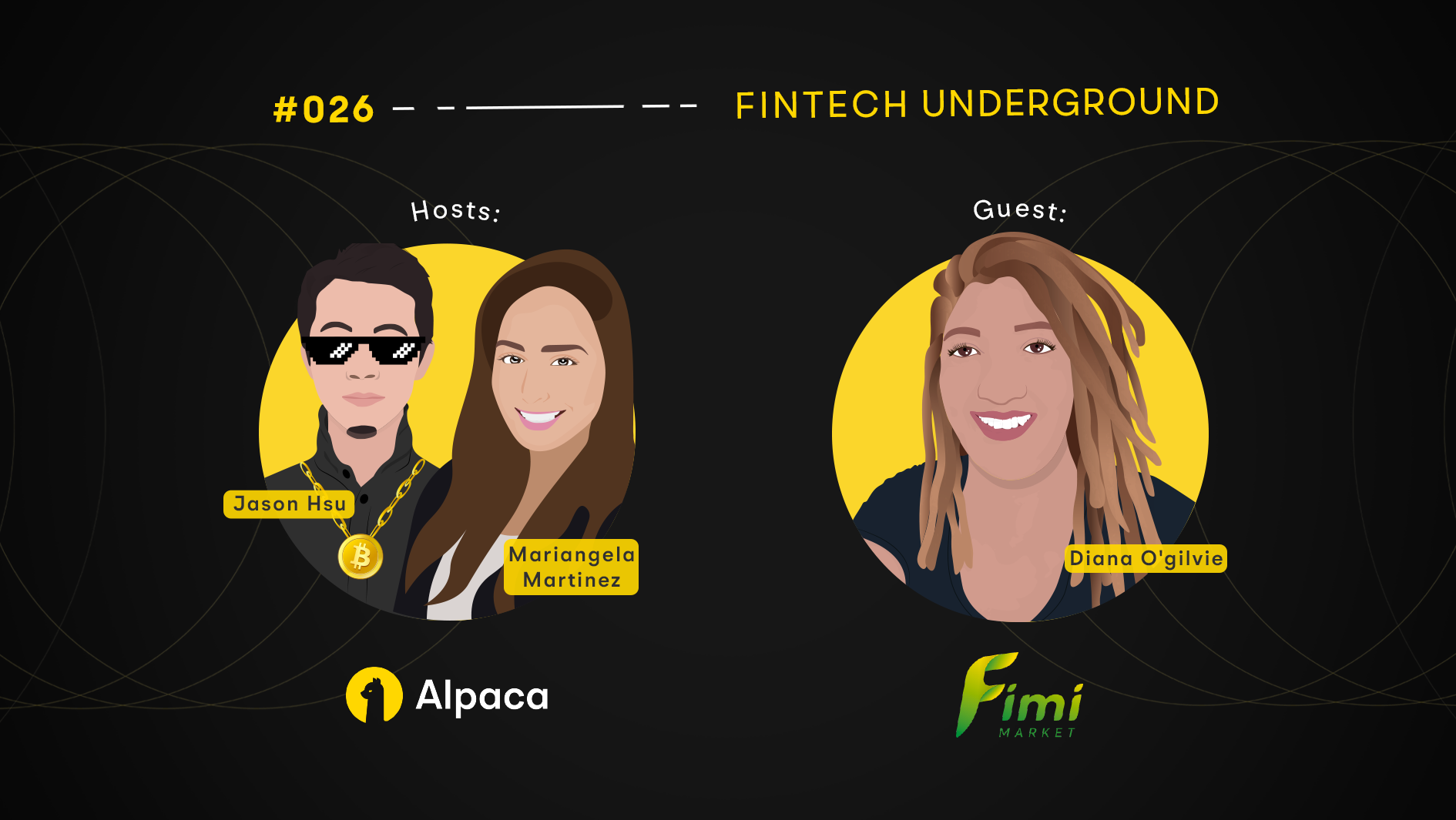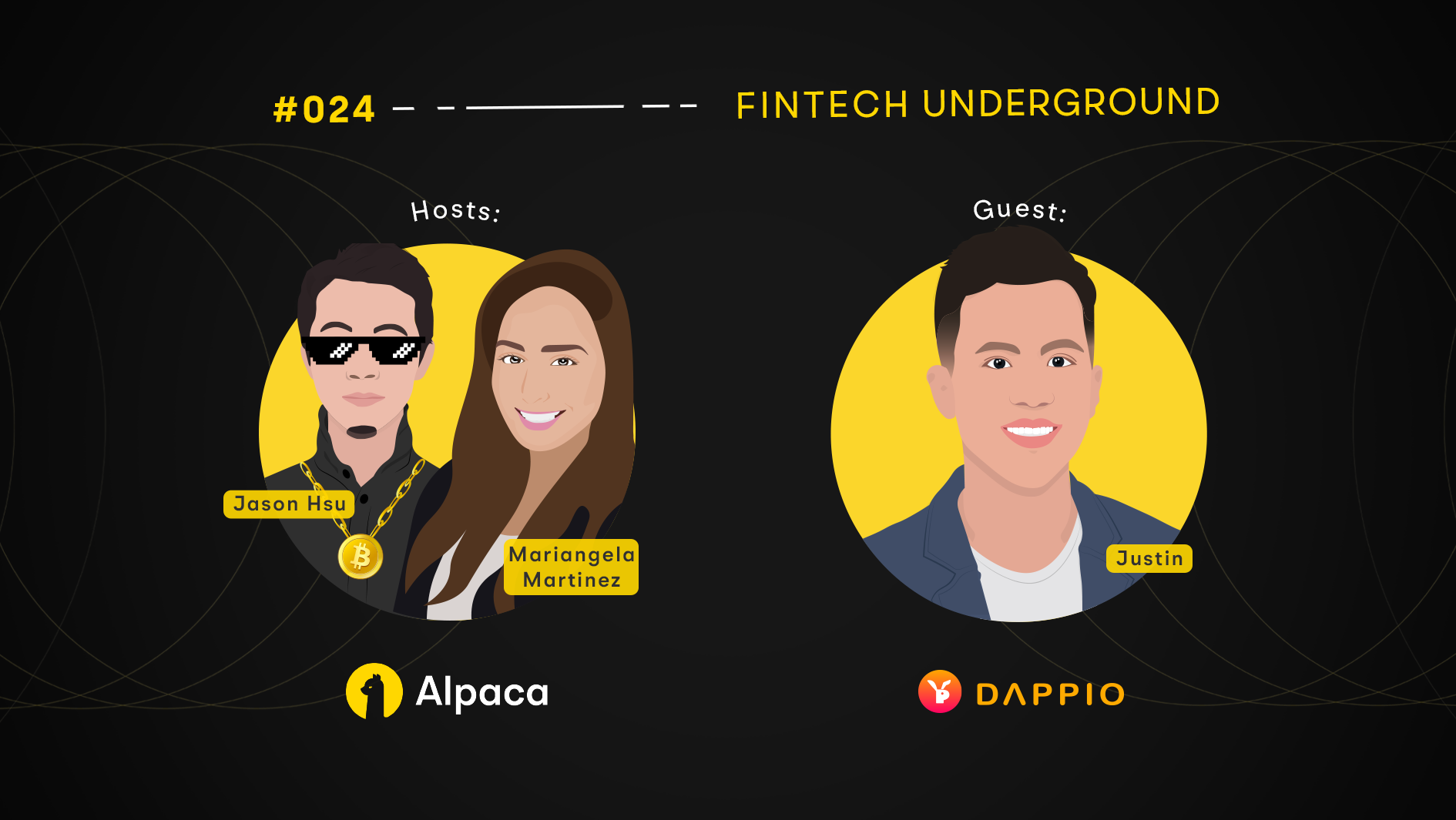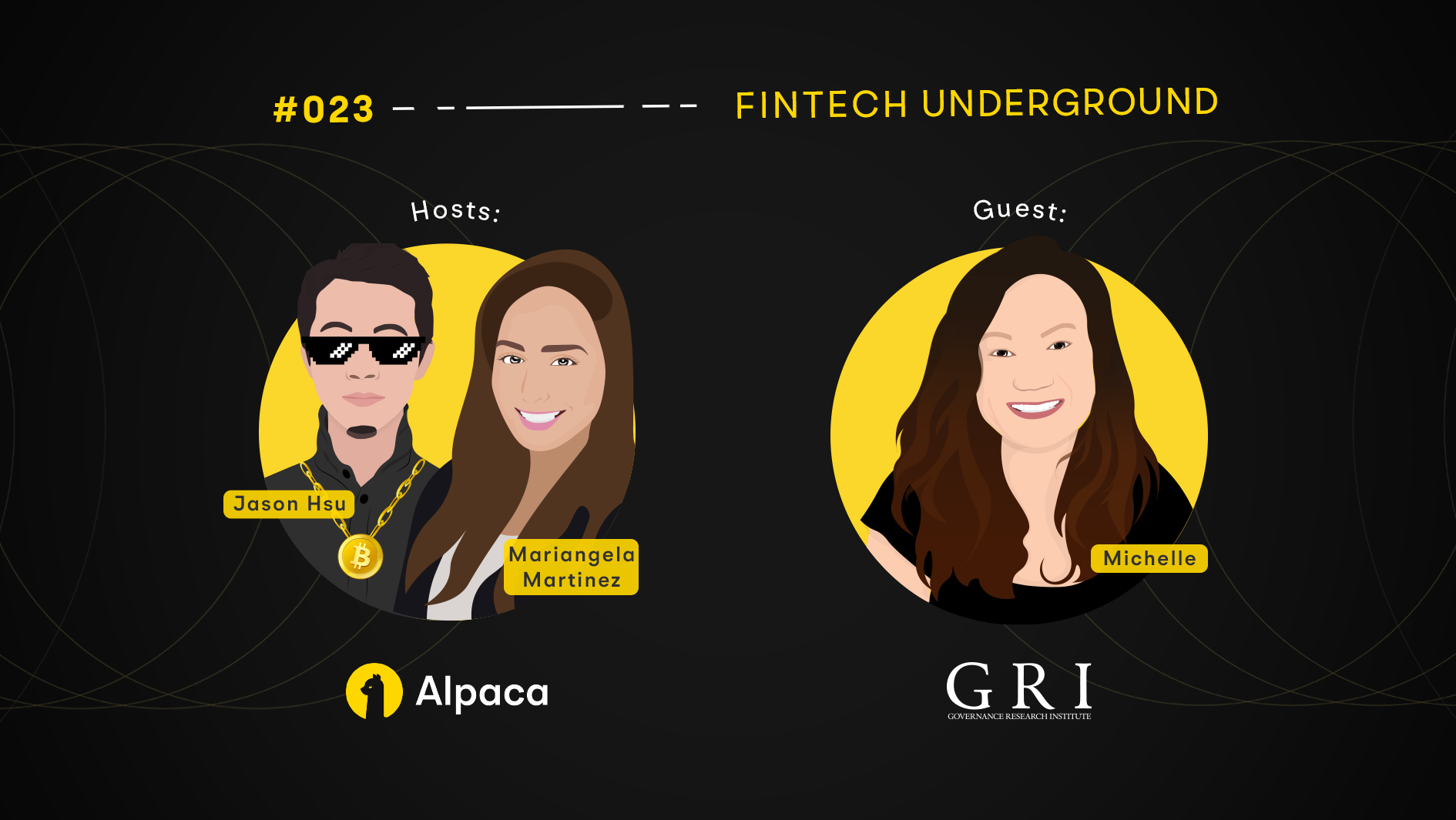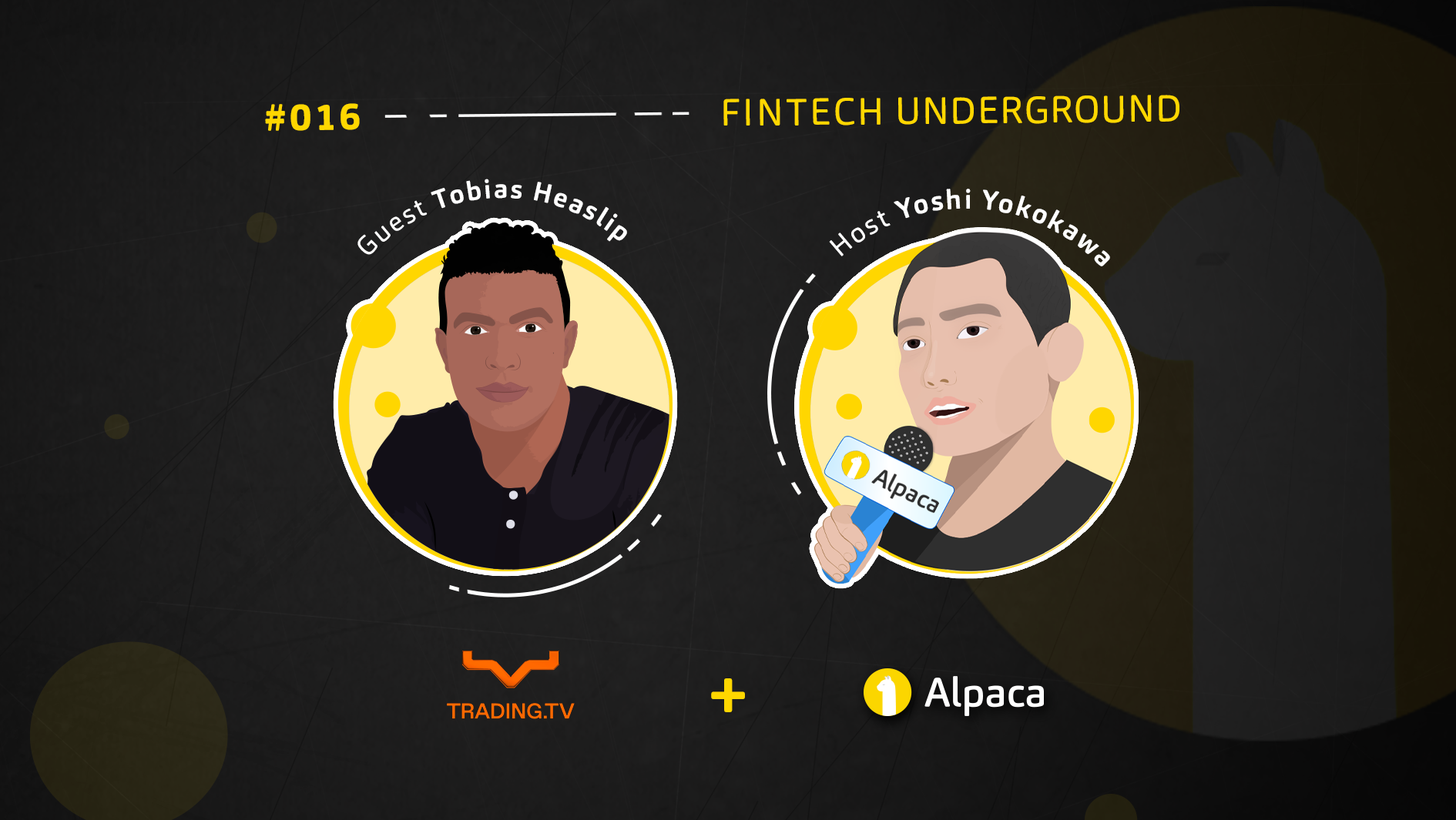
Any opinions expressed are opinions of the host and their guests. The content is for general information only and is believed to be accurate and reliable as of posting date but may be subject to change. Alpaca Securities LLC does not recommend any specific investments or investment strategies. Alpaca Securities LLC does not provide investment, tax, or legal advice.
Fintech Underground by Alpaca is a podcast devoted to all topics related to stock trading and APIs. From trading with algorithms to connecting apps to building out services, we aim to bring light to different corners of fintech.

TL;DR
In Episode 16 of Fintech Underground by Alpaca, we interviewed Tobias Heaslip. As the CEO and Founder of Trading.TV, Tobias discusses creator-led social investing, shoppable livestreams, and how he started TTV as a solo founder.

Find the full transcript below. To hear more CEO/Founders from the most interesting fintech companies speak about their experience in the industry, check out our other episodes below.
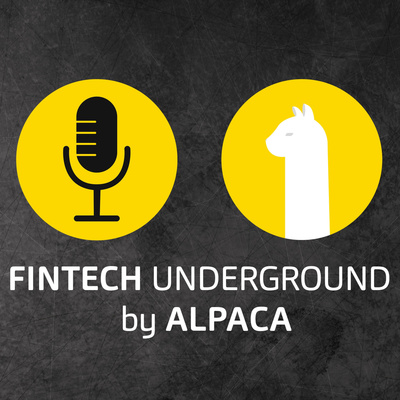
Full Transcript
Crystal: [00:00:00] Hi everyone! Welcome back to Fintech Underground by Alpaca, the podcast devoted to stock trading API. From algorithmic trading to connecting apps to building out services, Alpaca is built for developers and traders. In each episode, we aim to explore a different area within FinTech.
Today we have a special guest, Tobias Heaslip, CEO and Founder of Trading.TV, here to talk about what he’s building a social livestream platform for traders and financial content creators.
As usual Yoshi, CEO and Co-founder of Alpaca, is our host for today's episode. So let's dive right in!
Yoshi: [00:00:35] What's up Tobias, how are you doing today?
Tobias: [00:00:37] What's going on, Yoshi? Thank you so much for having me.
Yoshi: [00:00:39] Yeah. Where are you right now, man?
Tobias: [00:00:40] I am in FiDi right now. I just came back from Park City, so I’m readjusting to life in New York City right now.
Yoshi: [00:00:47] Oh, wow. Nice, nice, nice. You've been going on with a lot of announcements and exciting news, do you want to give a quick pitch about what Trading.TV does?
Tobias: [00:00:57] Yeah, absolutely. Trading.TV is the world's first tradable livestream and immersive chat platform for traders and financial content creators. I think the easiest way to envision phase one of the product is sort of a FinTech love child of Twitch and Discord, and the concept is simple yet transformative for the industry.
We have creators come on the platform, they create content via Livestream, video-on-demand, and immersive chat. We think of everything as an asset, so we cover everything from stocks and options to crypto and the exciting new Altspace. So NFTs, trading cards, rare sneakers. Fans, followers, and audiences can then trade those assets directly on the platform while watching the live streams.
Yoshi: [00:01:39] Great, man. It's a really nice elevator pitch. That's a beautiful one.
Tobias: [00:01:43] I've had a little bit of practice. I think I've done maybe a hundred VC meetings over the course of the last three months. So yeah, it's kind of just on auto record at this point.
Yoshi: [00:01:55] And by the way, congrats on the fundraising announcement. Do you want to talk a little bit about who led the round, what investors? I know the market is so excited about your product.
Tobias: [00:02:05] Yeah, absolutely. We just announced the $6.1 million seed round. It was led by L Catterton, Activant, Tribe Capital, and Navy Capital. Couldn't be more excited to have a fresh round of capital to fuel the growth! Right now is hiring mode, so that's my main focus, is getting out there, finding a bunch of great folks, especially on the engineering side, to help us build this product.
Yoshi: [00:02:26] You come from a great background in financial services, from Goldman to Morgan Stanley and Och-Ziff to Barclay's. What led you to what you're doing now? Of course, it's financial services, but at the same time, it's a combination of media and tech as well.
Tobias: [00:02:45] Yeah, absolutely. When I first started at Morgan Stanley, it was sort of the golden age of their investment banking franchise with regard to TMT deals and social media was just becoming an investible asset class. So it was really just lucky or fortuitous that I was the only young person on the desk at the time, that actually used the products of the companies that we were taking public.
So they asked me to become the resident social media expert. I helped take companies like Groupon, Facebook, Pandora, Zenga public, and I've been focused on social media and FinTech ever since. So in 2019, I really realized that there were two secular trends that I was willing to bet my career on.
One was the emergence of the creator economy, which is really just about passion, right? People deserve to be able to pursue their passions, to find a way to be able to monetize those and live life on their own terms.
And the second was the rise of the retail trader and the retail trading revolution, which is kind of correlated to the first one. People wanted to take those passions and financialize them, to inject cultural cachet into their investment portfolios.
And it was amazing to see all these vibrant groups that were taking place on Discord, on Reddit, on Facebook groups. And so I knew that there was going to be a once-in-a-generation opportunity to build a platform at the intersection of those two secular trends.
Yoshi: [00:04:00] Yeah, it's interesting. You have an extremely strong focus on the creator economy instead of just social investing. Do you want to talk a little bit about it, you are looking at a lot of FinTech companies and there are now more and more social investing and trading platforms and apps, and I feel like your focus is a little bit different than those that I see. Do you want to talk about that?
Tobias: [00:04:25] Yeah, for sure. I don't think that social investing in and of itself is enough. I believe strongly that it has to be creator-focused and creator-led. There has to be strong incentive programs in place for creators, and we really built this platform as a creator-first platform. So there's a number of different problems that exist on the horizontal side for financial content creators specifically.
And those problems are becoming further exacerbated with algo changes at Tik Tok and YouTube recently. So for me, I wanted to be able to build a platform that helps creators monetize, that really helps them build a business, as much as helps them build an audience. And if those incentive programs are in place and those creators feel great about the product and the business that they're running on your platform, then you get more content. More content leads to more users, which in theory should lead to higher trading volumes across all the different asset classes, which we support on Trading.TV.
Yoshi: [00:05:16] For the creator economy, there's always a chicken and egg problem, right? Even though we focus so much that we have a passion to support creators. How are you solving that chicken and egg problem?
Tobias: [00:05:30] For us, it's a supply-side model, meaning we go out and we get the creators first. So we raised 6.1 million; I took $1 million of that and I started a creator fund from day one. So that was part of the announcement. Above and beyond that, we have doubled the revenue opportunities that any other platform does, and it's really a leveling of the playing field.
If you think about creator funds that exist at the other horizontal platforms for financial content creators, it's largely inaccessible because they're competing against Charlie D'Amelio or Josh Richards, or Logan Paul. So we wanted to create a finance-specific platform. I believe strongly that finance is at a moment in time where it's ready to move from being sort of the opening act to the headliner of the tour, and the financial content creators deserve to compete against people within their own vertical for large checks and bonuses every single month. So we're going after the creators as the primary user acquisition strategy and then the content creators are incentivized to bring their audiences over to TTV.
Yoshi: [00:06:07] For the creator of the financial services, I always felt there's difficulty and complexity there because of the investment advisor side of regulations, like SEC or solicitation from trades. How have you been dealing with that? Because it always comes up in social or the marketplace.
Tobias: [00:06:51] Yeah, well, it's actually interesting because again, we're asset class agnostic and the vast majority of assets that are on Trading.TV. So as it currently defines, crypto, rare sneakers, trading cards, all of those things are not defined as securities, so it's less of a concern. Although we do have strong community guidelines and policies in place to prevent things like pumping and dumping, et cetera. On the equity side, we guide creators to not give individualized investment advice. And that's the main thing that the regulators are looking out for, is non-licensed investment professionals giving specific investment advice to individuals, but we believe that this is a freedom of speech issue.
Everyone should be allowed to talk about various trades and things that are going on in the marketplace that they think are going to affect asset prices. And it's really key for price discovery. But above and beyond that, our number one investment inception to date has been on legal compliance, regulatory, and we're being proactive about it.
We know that these conversations are taking place in Washington, DC. We reach out to regulators and we say, “Hey, we'd love to sit down with you”, talk to you about our business plan, inject our narrative, and me, coming from an institutional background with over 10 years of experience, working at the biggest hedge funds and investment banks in the world, I think I have a lot of value add information that I can share with them that ultimately, maybe they will or will not listen to, but before they decide to institute legislation, I'd like to at least share my point of view.
Yoshi: [00:08:17] That's a lot of work, in addition to building the product. By the way, your website and the teaser screenshots are really, really cool. Looking at your LinkedIn, you left Barclay's end of last year, and it's been pretty quick. How was the journey, was it difficult? Or was it pretty easy, compared to what you imagined?
Tobias: [00:08:41] Yeah, no, there's no easy day. I like to say the only easy day was yesterday. I'm sure you know, building an incredible company that you've built. But I think a big help, if I'm totally honest, this would've never been possible without COVID and the out-of-office situation. I moved out to Park City, Utah last year and you know, it's a two-hour difference between there and New York, and the days are just much longer out in the mountains. So at the end of the workday, I would start working on Trading.TV and laying out the business plan and kind of starting to ideate on exactly what the product was going to look like, and building up a team.
So by the time I had officially resigned from Barclays, the foundational pieces of what would be Trading.TV were already in place. And that's the key to entrepreneurism, right? Move fast, break things, keep the momentum going. So I push the team hard every single day, but everyone's super excited about what we're doing and thankfully, users, creators and investors have been there to support us along the way.
Yoshi: [00:09:42] How did you build up the team, because you are a solo founder ideating things, right? And you don't come from a tech background, so how was your journey finding the right team to implement and execute this?
Tobias: [00:09:58] It was tough. I started looking for a team probably early last year and you meet a lot of people. You ask questions, you know? I was lucky enough to have a huge network of people from my time on Wall Street that had moved on to venture cap, private equity, a few people that had moved from investment banking and to being operators of businesses.
But this is really when your network and the experience of your network comes into play. You have to go out, you have to ask a lot of questions. You have to be humble. You have to know what you don't know. And then luckily I found slowly, but surely the key members of my team and things kind of fell into place, but it's definitely a process and it's one that's still ongoing.
I mean, I think every entrepreneur, especially at the pre-seed, seed, and series A is always looking to meet, you know, a 10 X engineer. So if you have any that you know of, please send them my way!
Yoshi: [00:10:48] That’s great work. I think I want you to send some good people our way too.
Tobias: [00:10:55] I mean, it's amazing. If I could think about going back to college, I don't know why anyone would study anything other than computer science. It's literally a hundred percent guarantee that you're always employed. So, yeah, that's the main challenge, right, finding talented people. Right now in the marketplace, it's particularly difficult because there are so many amazing companies that are getting venture cap funding.
There's a ton of companies that have reached unicorn status. So everyone's kind of waiting for a liquidity event and this becomes an existential issue. Can you find and attract enough talented people to make this vision come to life? And so, my job as a founder and CEO is to make that happen for my company, Trading.TV.
Yoshi: [00:11:33] Wow. That's great, man, because I remember when I started after working at Lehman Brothers and Nomura, and of course, I'm not a computer science major. I had to really get friends from college and my co-founder, CTO Hitoshi, is my best buddy from college. And he happened to be in computer science. So that is just a coincidence that I had to get this whole team going.
Tobias: [00:11:58] Yeah, it's a lucky break, but wow did that ever work out for you. So congratulations on that, but I mean, I think now with the advent of social media and LinkedIn, and all of these things, you kind of realize how interconnected this entire industry is. And if you're willing to hustle, it's definitely doable, but not without its challenges and difficulties.
Yoshi: [00:12:19] When you were doing the ideation of this product, what companies or services did you really, really dig into and research to come up with Trading.TV?
Tobias: [00:12:30] I actually didn't take the inspiration from anything in the United States. I took inspiration from shoppable live streaming in Asia. I was looking at different trends because when I first started trading about 10, 11 years ago, it used to be that innovation exists in the United States and then kind of moved to China and the rest of Asia.
And then probably about seven, eight years ago, that switched. China was actually innovating more rapidly than companies in the United States and their ideas were making their way over here in the form of companies. So I've always kind of kept an eye and the finger on the pulse of what was going on, and shoppable live streaming started to pop up.
And I was just amazed by the growth of it. I think last year was like a $60 billion industry in China alone, growing at multiple, triple digits. So I looked at that and I said, okay, this is effectively QVC or HSN brought to the digital age and applied to financial instruments, in the case of Trading.TV.
And as opposed to a shoppable livestream where most of the stuff they're selling there is perishable or a one-time purchase where you buy it and you either give it to your kid or put it on the shelf or whatever, financial assets are there for forever, unless they get taken out or go bankrupt. But most of them are around forever.
So it becomes a much better thing to create a product around because it can be traded an infinite number of times. And then in addition to that, the assets make money by doing nothing. Once they're in custody, you know, you can lend them out in the stake of in crypto. You can stake them, you can build cool innovative products on top of them.
It just made a ton of sense to me. And the one thing that was missing from the American market was the context behind all of these new asset classes. Even for me, being fairly sophisticated on the finance side, all these emerging asset classes, I had no idea where I would go to learn about them.
A year ago, no one was talking about NFTs. Now everyone's talking about NFTs. Okay, great. Why are there NFTs that are 5 cents and NFTs that are $57.5 million? Someone explain this. Why is a Steph Curry rookie card the greatest buyer ever at $5 million? There's just so much context that can be added to it, and that was really something that I felt like I could build a business around, from a content perspective.
Yoshi: [00:14:44] That's so interesting, talking about this stream of innovation coming from Asia and how you're getting so much inspiration from the outside. I think I had a similar thought process looking at the evolution of FinTech and from our side, it's all about infrastructure and better finance. And I think in better finance that leads to the apps becoming all super apps, and the super app concept came from China, obviously, from WeChat.
Tobias: [00:15:13] Yup, you already know.
Yoshi: [00:15:16] Right. Yeah. And to Indonesia, like, you know, Grab and Gojek. Not really the U.S. I think Casha probably is really the first one who's probably being successful doing that, but yeah. I completely agree with that.
How did you start thinking about international trends, because I see that a lot of people and especially tech companies in the United States, usually look at the companies in the US. What really pushed you to look at this whole global trend instead of just looking at the US?
Tobias: [00:15:47] It was really just the experience of having traded professionally for so long and understanding where good ideas were coming from. And then the manifestation of those good ideas into product, and eventually into game-changing or segment-defining companies in the United States. So something that I had done as a way to be able to identify stocks that I wanted to buy when I was on the trading desk. And it almost felt like cheating.
It felt like getting in a time machine where you could look at what was working in China or working in Japan or South Korea and saying, okay, well, it's only a matter of time before that makes its way into the US, and you can be early on the trends. And in the shoppable livestream stuff, you've seen a lot of cool companies pop up. I don't know if you've checked out Pop Shop Live, but they're doing amazing stuff and that companies like whatnot. So it's not hard to identify if you kind of are trained to pay attention to it.
I'm really interested in the super app concept that you talked about too, because if I could dream the dream, that would be what would become, right? A fully vertically integrated financial super app. So starting off with content, using that content to get a wedge into brokerage, do banking services, and it's something that no one's really been able to do successfully.
I kind of think about it across any category in America yet. So it makes a lot of sense to me. I mean, I think everyone's kind of tired of 20 pages of apps on their iPhone. We can consolidate these things, so we'll see how it goes, but yeah, that's the dream, the ambition.
Yoshi: [00:17:12] Yeah, so talking about your ambition and kind of long-term goals, who has been your first group of adopters, who's the consumers of the content?
Tobias: [00:17:25] We're starting off with the creators first and the common denominator amongst all of our early creators is diversity. So diversity in terms of age, sex, race, sexual orientation. It's incredibly important to me as a minority founder to have a community and a platform that celebrates diversity and inclusion. It's not lip service that I pay to it. It's something that I work at every single day. We really wanted to go out and we wanted to get a very diverse and eclectic group of content creators, and that sets the gold standard for the platform that we want to be and the company that we want to have moving forward.
In addition to diversity of different age sex, race, demographics, diversity in the asset classes. So yes, there's a place for stocks, but there's also a home for the crypto community, the DeFi community, the entire alt community. So really bringing all these things together, because in my mind, the investing ecosystem is as interconnected now as it ever has been before. And I think that diversification in those asset classes makes a ton of sense.
Yoshi: [00:18:22] Mhm. I completely agree because I was doing basically only alternative assets. And like you said, I was doing subprimes and abs CDOs and all those things, so I really appreciate that.
Tobias: [00:18:33] Yeah. You worked at Lehman Brothers, I worked at Barclay’s, which is your new Lehman. But you're right, you walk into the building and there are six trading floors and you can trade everything from subprime mortgages, interest rates, swaps, commodities, you know, whatever.
And I thought we could probably build a product around that, but those things are pretty boring. So why don't we actually build a product around the things that people are passionate about? And it turns out that these communities already existed, and it was really just about productizing that experience.
Yoshi: [00:19:04] Yeah, definitely. When you focus on diversity and inclusion, I think that becomes more important. For us, we really care about global diversification because we want to reach out to every single person on the planet. So unless we know about the context in what's happening locally, we wouldn't know. We try to work with members across the globe.
How are you sourcing the creators with diversity, do you just go to YouTube and find the right talents that you want to really source into your platform?
Tobias: [00:19:39] There's no magic formula for it. It's hard work. And even if you're willing to pay money to agencies to go out and do that search, the reality is that this is such a new segment of social in terms of being a financial influencer or finfluencer, whatever the term is, a lot of the big agencies don't actually have representation for these people yet.
They don't have an arm built out. If you wanted to reach beauty influencers, travel influencers, you know, there are tons of agencies that can hook you up with a thousand of them overnight. But if you say, Hey, I want a thousand connections to financial influencers, that's an arduous process and they're basically going to do what you would have to do internally, which is reach out and cold call.
So there's not a secret formula. It's a challenge, but I think awareness is really big. We've been making a big push from a PR perspective, creating great content every single day on social and being uber consistent with that, doing podcasts, you know, getting out there, and having thought leadership. Those things are important and it's a snowball effect, right? It starts small, and then eventually it kind of takes on a life of its own, has its own momentum and it's picking up a lot of steam as it goes.
Yoshi: [00:20:49] Yeah, igniting the first fire is so important, so difficult. We also try to do as much as possible for the community of makers and developers. And that's something that we've been pushing on extra hard, but before getting here, we had to open-source the first, our core IP of database product to open source, GitHub. And that really firstly created the attraction among developers. But after that, it's really the manual process of how we can put ourselves everywhere, including social media, cold calling to the media journalists.
And by the way, congrats on getting coverage on a bunch of the big media, that's, that's crazy great.
Tobias: [00:21:38] Yeah, thank you so much. I totally agree with you, it’s a 360 approach. It's all hands on deck. You have to be doing it every single day. Like I said, there's, there's no easy day, so it's really important to be able to get your narrative out there and to have an identity, and to find your voice.
And so that's a big thing of what we're working on every single day at TTV, is getting our narrative out there and finding that voice. So I've been writing a lot on blogs like Medium and no one reads them yet, but hopefully one day they'll be sort of well-distributed and well-read, and doing everything that you can to make sure that people understand the mission, the vision, the product that we're trying to build.
Yoshi: [00:22:17] So, talking about the product, what is the next thing that you're excited to work on?
Tobias: [00:22:25] We've built a live stream platform, a video-on-demand platform, and a chat platform. So we've brought the core elements of both the creator experience and the user experience, the same platform for the first time ever.
What we're working on right now is an integration with your company. That'll be the next big thing that actually rolls out, will be commission-free trading. And US-based stocks, fractional shares, and ETFs, which should be out in Q4 of this year. And so that will be the moment in time where we move from a private beta to a public beta, and the world will be able to have tradable livestreams for the first time ever.
Yoshi: [00:23:01] Great. I mean, that's beautiful. I'm personally very excited about this and we're super excited as a team as well. We're getting close to the close of the podcast, but I always ask this to founders.
Considering all these things you touched upon like regulations, all of those licenses, as well as the difficult things with the chicken and egg problem, you have to worry about a lot of things. Even though you may not be in the financial services, FinTech industry, but because you are in fintech, you have to care more about things that other industries may not have to care about.
So with that, I always get this frustration. If we weren't in the financial services industry and doing this, we probably can focus on things in a much more, clear way without allocating my head into something that I may not have to. So the question to you is, is FinTech worth it? Being in the FinTech industry. Is it really worth it?
Tobias: [00:23:58] Yeah, of course, it's worth it. I mean, we're making a material difference, right? I mean, like all jokes aside, I think the goal for us is to make financial freedom a reality for potentially billions of people around the world. To get more and more people, especially people that come from underserved communities that would never have access to financial markets, access.
You're democratizing it, I'm democratizing it. We're democratizing the information. I've seen behind the curtain how institutional Wall Street operates and the dirty secret is that this stuff is not that hard. It can be taught. It's a trade, it's a skill like everything else, and it's really the only way to financial freedom. So I'm more than happy to be at the vanguard, in the fight to be able to get this thing right.
Yoshi: [00:24:44] That's great to hear, and especially from you, looking behind the curtains from a bunch of the big established companies. And I feel the exact same way, how can we apply and reflect what we have learned and seen into a more mass-production way, reaching as many people as possible.
And I think we share that vision too, you know, how we can give that to everyone? Tobias, man, thank you very much for coming on the show, and I really appreciate you sharing a lot of your thought processes. I really appreciate you working with us and am very excited for the next step, man. Thank you.
Tobias: [00:25:22] Thank you so much for having me, man.
Crystal: [00:25:24] Thank you for joining us today on this episode of Fintech Underground by Alpaca. As always, check out all of our past episodes on Apple Podcasts, Spotify, and other major streaming platforms.
If you liked this episode of Fintech Underground by Alpaca, make sure to check out our other episodes below!

You can also follow Alpaca and our weekly updates on LinkedIn and Twitter.
Brokerage services are provided by Alpaca Securities LLC ("Alpaca"), member FINRA/SIPC, a wholly-owned subsidiary of AlpacaDB, Inc. Technology and services are offered by AlpacaDB, Inc.


